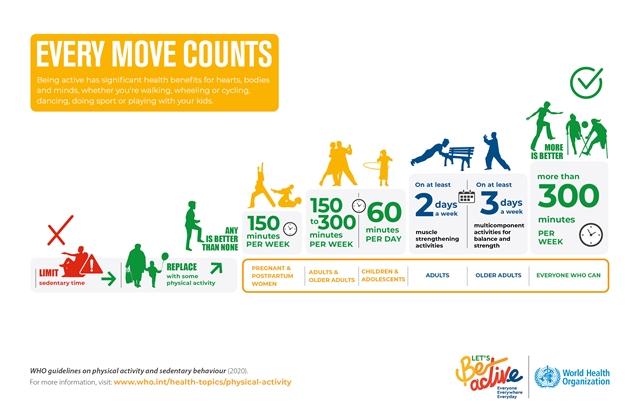 Life & Style
Life & Style

Dr Ria Duthie*
 |
| Dr Ria Duthie. Photo courtesy of Family Medical Practice |
The WHO defines physical activity as 'any bodily movement produced by skeletal muscles that requires energy expenditure'. Physical activity is not just structured time dedicated to exercise - it involves any active movement including daily steps, commuting to/from work, domestic tasks such as cleaning and leisure activities.
Along with higher levels of sedentary type work, involving prolonged periods of sitting through the day, people are becoming less active as daily life becomes more efficient. For example, rather than walking to work or a friend’s house we take a car or motorbike and rather than walking to the grocery store buying food and cooking, we can order food to our front door at the tap of a screen on our smartphones. The accumulation of many of these changes lead to higher incidence of inactivity.
Physical activity is an essential component of maintaining both physical and mental health. Sedentary behaviours and inactivity are leading risk factors for death from non-communicable diseases. People who do not meet physical activity guidelines have a 20-30 per cent increased risk of death compared to people who are sufficiently active. According to the WHO, 31 per cent of adults and 80 per cent of adolescents do not meet the recommended levels of physical activity.
Some of the main benefits of activity include:
A reduction in:
- All-cause mortality
- Cardiovascular disease
- Hypertension
- Site-specific cancers
- Type-2 diabetes
- Falls
- Obesity
Improves:
- Mental and cognitive health
- Sleep quality and duration
Different types of exercise have different benefits and while any activity is better than no activity, it is important to incorporate cardiovascular exercise, strength training and also balance exercises into your routine.
If you are already active then great – continue to build on your current routine and ensure it is balanced and includes a mix of cardiovascular exercise and strength and balance training. If you are not meeting the recommended activity guidelines then start with small changes and build up the intensity and effort over time e.g. try to add an extra 1000 steps/day or try some body weight strength exercises. If you have underlying medical conditions or pre-existing injuries you should seek guidance from your doctor or physiotherapist before commencing a new exercise programme.
I don’t know what to do - how do I start?
- Sit less, move more!
- Increase daily step count
- Walk part or all of your journey to work/school
- Make phone calls while standing or going for a walk
- Take the stairs instead of the lift
- For short journeys walk rather than using transport
- Go to the supermarket rather than ordering food online
A healthy physical routine looks different for everyone, for some it may involve running marathons and lifting weights in the gym. For others it may be a daily walk and Pilates classes twice a week. Find a routine that is manageable for you, that you can be consistent with and enjoy! Family Medical Practice
 |
*Dr Ria Duthie is a physiotherapist at Family Medical Practice with over a decade of experience in healthcare. After earning her BSc in Physiotherapy from Robert Gordon University in Aberdeen, Scotland, in 2013, she began her career at a private physiotherapy clinic before dedicating seven years to the National Health Service (NHS) in Scotland. During this time, she gained extensive expertise across diverse clinical specialties, including stroke rehabilitation, orthopaedics, respiratory care, critical care, cardiology, musculoskeletal injuries, emergency medicine, learning disabilities and geriatrics.
Since joining Family Medical Practice in HCM City, Dr Duthie has been treating adult patients with conditions such as musculoskeletal pain, stroke, respiratory issues and post-surgical rehabilitation. She also collaborates with paediatric doctors to provide specialised care for children.
To book an appointment with Dr Ria Duthie, please contact our FMP medical centre at 95 Thảo Điền, District 2, HCM City, via phone at (+84) 28 3744 2000 or email d2.reception@vietnammedicalpractice.com.
Family Medical Practice - FMP Healthcare Group operates medical centres in major cities including HCM, Hà Nội and Đà Nẵng, offering consultations with international doctors, check-up centres and emergency ambulance services. In HCM City, we have clinics in Districts 1, 2 and 7, along with the Care1 - Executive Health Check-Up Centre and internationally accredited *9999 emergency ambulance services.




